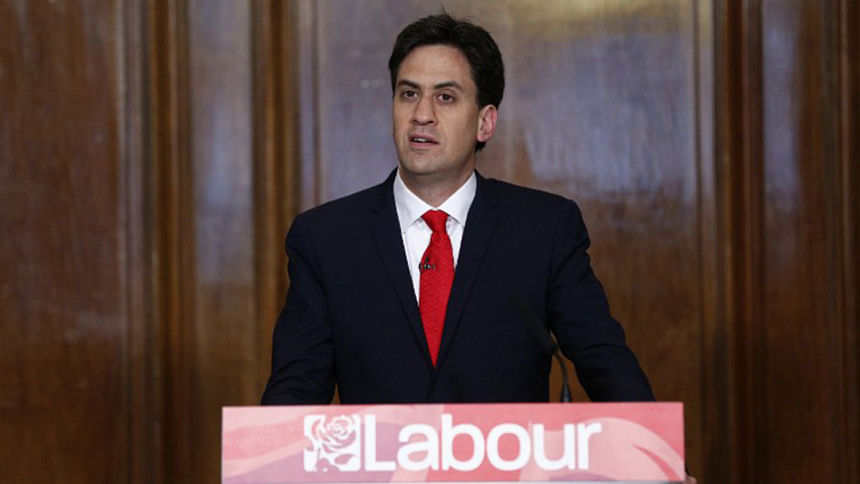Miliband resigns as Labour leader

Ed Miliband is stepping down as Labour leader after his party's disappointing general election showing.
Labour suffered heavy losses at the hands of the SNP, with the Tories forecast to achieve a majority.
In a speech in London, Miliband said it was "time for someone else" to take over the leadership and that he was "truly sorry" he did not succeed.
Shadow chancellor Ed Balls was among the party's big-name casualties.
It also lost its election campaign chief Douglas Alexander and its leader in Scotland Jim Murphy.
'Deeply sorry'
Miliband was applauded by staff as he arrived at Labour headquarters in central London.
He confirmed deputy leader Harriet Harman would be interim leader, and that he would step down after the VE Day commemorations later on Friday.
"I joined this party aged 17," he said. "I never dreamed I'd lead it."
Miliband said he had done his best for five years, and that it was "not simply leadership that achieves change".
"I will never give up on fighting for the Britain that I believe in," he added.
Earlier on Twitter, Miliband said: "I am grateful to the people who worked on our campaign and for the campaign they ran. The responsibility for the result is mine alone."
Labour would "never stop fighting for the working people of this country", he added.
Earlier the Labour leader, who took charge of the party in 2010, said it had been a "very disappointing and difficult night" for his party, which is forecast to win 234 seats, compared with 258 in 2010.
Speaking after retaining his Doncaster North seat, he said his party had been overwhelmed by a "surge of nationalism".
He added: "Now I want to say to all our dedicated and decent colleagues in Scotland who have lost their seats that I am deeply sorry about what has happened."
Balls lost his Morley and Outwood seat to Conservative candidate Andrea Jenkyns by 422 votes.
"Any personal disappointment I have at this result is as nothing compared to the sense of sorrow I have at the result Labour has achieved across the UK, and the sense of concern I have about the future," he said.
Balls said questions would arise about the future of the United Kingdom and Britain's position in Europe over the next five years.
'Catastrophic night'
Labour also lost previous leader Gordon Brown's former constituency to the SNP as the nationalist party almost swept the board in Scotland.
Alexander lost his seat to a 20-year-old student after a massive 26.9% swing from Labour to the SNP in Paisley and Renfrewshire South.
Conceding defeat, Murphy said: "The party that has traditionally been the tireless champion of the underdog now finds itself in the position of being the underdog.
"Scotland needs a strong Labour Party and our fight-back starts tomorrow morning."
Former Labour Home Secretary Lord Reid told the BBC "changing the captain" would not necessarily improve Labour's electoral prospects.
"They (the public) thought we were on the wrong side of all the major arguments - our economic competence, on the question of creating wealth rather than just distributing wealth, on the question of immigration, on the question of reform of the public services," he said.
Another Labour peer, former First Minister Lord McConnell, said his party had experienced a "catastrophic night".
"I think the Labour strategy for this election was always going to end up in this situation," he said.
"The idea that we could poll between 30 and 35% and pull off a victory was not going to work."

 For all latest news, follow The Daily Star's Google News channel.
For all latest news, follow The Daily Star's Google News channel. 



Comments